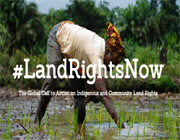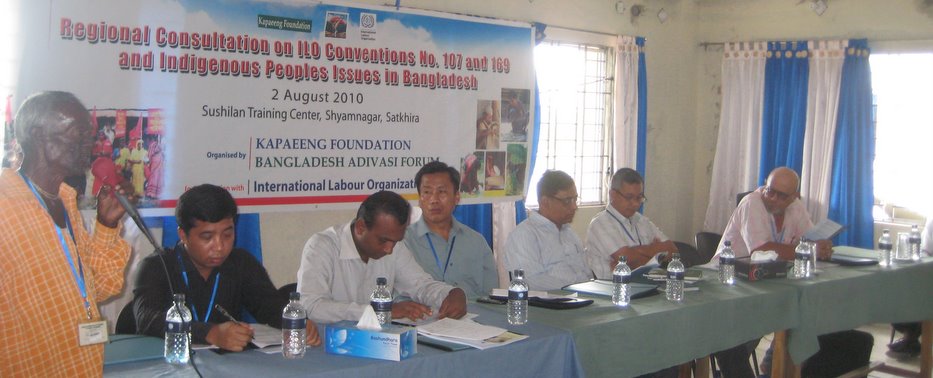
On 10 March 2011 the Regional Consultations on ILO convention No.107 and 169 and Indigenous Peoples Issues in Bangladesh were held at Family Planning Association Auditorium, Ghasipara, Dinajpur organized by Jatiya Adibasi Parishad and Kapaeeng Foundation (KF) in cooperation with International Labour Organization, Bangladesh.
At first, a formal inaugural session took place in the program. Mr. Rabindranath Soren, General Secretary of Jatiya Adibasi Parishad and Chairperson of Kapaeeng Foundation presided over the meeting while Mr. Mohammad Jamaluddin Ahmed, Deputy Commissioner, Dinajpur was present as the chief guest. Mr. Dipayan Khisa, Vice Chairperson of KF, Mr. Abhilash Tripura, National Coordinator, PRO 169, ILO, Dhaka, Mr. Syed Mosaddek Hossain Labu, Mr. Anil Marandi, President, Jatiya Adibasi Parishad, Mr. Shaktipada Tripura, Organizing Secretary, Bangladesh Indigenous Peoples Forum and PCJSS were present as special guests.
Mr. Dipayan Khisa, vice chairperson of KF, in his welcoming speech, says, “we have been organizing such consultations with both indigenous peoples and main stream peoples in different regions of Bangladesh regarding ILO convention 107 and 169 and indigenous peoples’ rights. KF has been working for long time in order to protect and promote indigenous peoples rights in Bangladesh. The main aim of this program is to build up capacity of Indigenous Peoples regarding fundamental human rights including education, medical care, shelter and so on.’’
Mr. Abhilash Tripura, National Coordinator of ILO, Bangladesh, says, “ILO usually works for labourers’ rights. Bangladesh Government already rectified the ILO convention 107, so there is a state obligation to implement the convention. Everyone is not aware about ILO convention 107 and 169. That is why ILO is working to create awareness in different regions.” He says, “ILO has been working with the government to make conscious and amiable the government officials and policy makers regarding Indigenous Peoples’ rights. ILO has been working with several ministries very closely due to ascertain Indigenous Peoples rights. ILO will have to work together through identifying the problems. Present government is very positive; it should implement its election manifesto. There are already few positive changes. The awareness in national level is increasing. The! indigenous peoples’ problems are not limited within the concerned peoples any more, today’s program shows that, mainstream people is also coming forward regarding the indigenous issues. We warmly convene the local administration to solve the problems of indigenous peoples in local level.” he says.
Mr. Syed Mosaddek Hossain Labu, former Mayor of Dinajpur Municipality, says, “Indigenous peoples of Bangladesh are deprived of their rights. The ILO conventions are not being implemented. Government also makes many laws. But they are not being implemented. I think people should be alert and fight for their rights. In order to promote and protect of indigenous peoples’ rights the movement should be conducted with integrity.”
Mr. Anil Marandi, president of Jatiya Adivasi Parishad, says, “Government declared that, census will be started soon. But we are still in some problematic condition in this matter. There are many indigenous peoples in north Bengal in Bangladesh, who have not been documented for the census. Birsha Munda was a member of indigenous Munda people, who led a movement against the then British rulers. But Munda community was not incorporated in the census. We will have to work together for them who were not documented for census.
Mr. Shaktipada Tripura, organizing secretary of Bangladesh Indigenous Peoples Forum and PCJSS, says, “Bangladesh government rectified the ILO C107 soon after the independence. The convention recognizes the rights of land, education, culture and so on. But the traditional rights of indigenous peoples were not incorporated in Bangladesh constitution. Indigenous peoples are not recognized in Bangladesh constitution too. The exact numbers of indigenous peoples are unknown yet. They are facing problem who were not included in ethnic minority institution act. The discriminatory census will create problems for indigenous peoples. The indigenous woman is most vulnerable in Bangladesh. He says, “the rights can not be achieved without any struggle. So, the movement should be conducted with proper integ! rity.”
Dr. Mohammad Ahad Ali says, “The local problems of this region should be identified and everyone should come forward to solve the problems. According to the constitution everyone have the rights. Public Service Commission (PSC) recommended to the government to dismantle the quota system which was acceptable. I have been trying my best to ensure the justice for indigenous peoples. In order to ensure the justice everyone must conscious and vigorous. It was impossible to know regarding indigenous issues before 10/15 ago, which is possible to know in present situation.”
Mr. Abul Kalam Ajad, president of sector commanders’ forum, Dinajpur, says, “There are human rights violations in indigenous regions of Bangladesh, but there are no justices. Indigenous peoples are living in trouble and sufferings. The constitution recognizes the rights for all, but the real condition is very meager.” He says, “indigenous peoples of this region are present in the way of struggle, because they are fighters. But the laws and verdict are against of them. The struggle of indigenous peoples should be carried out but it should be strengthened with solidarity. Indigenous peoples are losing their land continuously. Everyone should protest collectively against this kind of misdeed.”
Mr. Rabindranath Soren, general secretary of Jatiya Adibasi Parishad and the Chairperson of KF, says, “Indigenous peoples like to be identified as the ‘indigenous peoples’. But the rulers or government constantly try to identify us in different terms. Government although promised to indigenous peoples, but there is no reflection of such kind of hopeful statement. So, these are making us hopeless. The state mechanism every time tries to keep backward the indigenous peoples. The government of Bangladesh every time denies the existence of indigenous peoples in several UN meetings, which is a matter of great lament. The indigenous peoples also took part in language movement of Bengali nation, but their mother languages are under process to disappearance.”
The inaugural session was followed by working session-I. Mr. Abhilash Tripura, National coordinator, PRO ILO169 of ILO Dhaka presented keynote paper on ILO Conventions and the Rights of Indigenous and Tribal Peoples in the session-I. The session was chaired by Professor Gonesh Soren, President, Dinajpur District Adivasi Samaj Unnoyon Somity. Mr. Syed Jahangir Alam, Mayor of Dinajpur Municipality, Mr. Ajadi Hai, President of Bangladesh Mohila Parishad, Dinajpur, Advocate Jowakim Kalko, General Secretary of Jatiya Adibasi Parishad, Rangpur and Ms. Lina Jesmin Lushai, Consultant of ILO, Bangladesh, also took part in the discussion.
The working session-2 discussed on Problems and Prospects of Indigenous Peoples of Rangpur Region. The session was chaired by Advocate Monilal Das, President of Jatiya Adivasi Parishad, Rangpur. Mr. Shajahan Saha, President of Nabarupy, Dinajpur, Mr. Babul Tigga, General Secretary of Jatiya Adivasi Parishad, Thakurgaon, Mr. Sital Mardi, General Secretary of Jatiya Adivasi Parishad, Dinajpur also took part in the discussion of the session.
In the working session-3, Mr. Shaktipada Tripura, Organizing Secretary of Bangladesh Indigenous Peoples’ Forum and PCJSS presented keynote paper on Situation of Indigenous Peoples in Bangladesh. The session was chaired by Ms. Sara Marandi. Mr. Chitta Ghosh, President of Dinajpur Press Club, Advocate Babul Rabidas, Jatiya Adivasi Parishad, Joypurhat, Mr. Laxmi Kanta Hasdak, President of Jatiya Adivasi Parishad, Dinajpur, also took part in the discussion.
Following recommendations have been raised in the consultation:
1. To implement ILO Convention No. 107 ratified by Bangladesh Government properly;
2. To ratify more progressive ILO Convention No. 169 by Government of Bangladesh;
3. To return land of indigenous peoples that grabbed by using the Vested Property Act and to stop such repression on indigenous peoples;
4. To ensure security of life and property of indigenous peoples;
5. To allot adequate fund for socio-economic and educational development of all indigenous ethnic groups;
6. To reserve seat in the local government councils for indigenous peoples of plain land like in CHT and to send proposal to the government from Deputy Commissioners of this region;
7. To strictly follow East Bengal State Acquisition and Tenancy Act of 1950 in selling and transferring land of indigenous peoples in plain lands;
8. To try and punish those persons who involved in indigenous peoples’ land grabbing;
9. To make a fund for indigenous students so that they could not deprive from education and ensure education through indigenous language;
10. To form a committee on indigenous affairs with indigenous representatives at district level in plain land to look after indigenous issues;
11. To ensure security of indigenous women and to take action for stopping violence against indigenous women;
12. To ensure quota for indigenous peoples in all government services;
13. To take necessary measures to preserve literature, culture and history of indigenous peoples;
14. To include indigenous ethnic groups who are excluded from list.
The concluding session was followed by documentary film show of a local context and cultural evening, conducted by local indigenous artists.



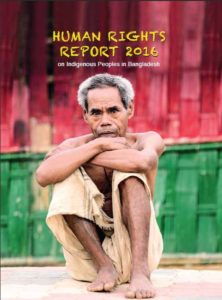
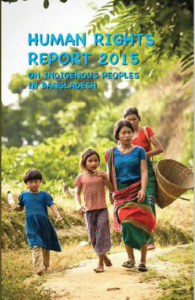
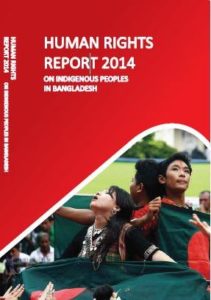
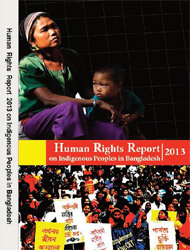
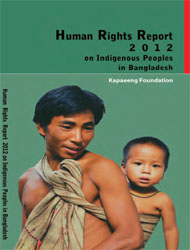
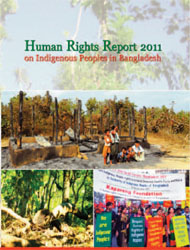
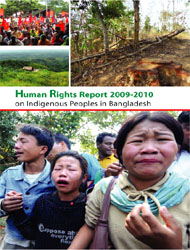

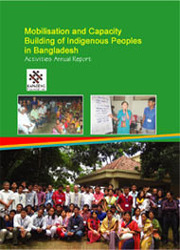



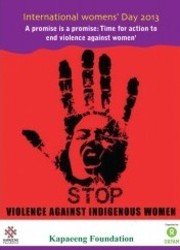
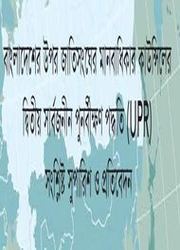
 March 11th, 2011
March 11th, 2011  KapaeengUser
KapaeengUser  Posted in
Posted in 